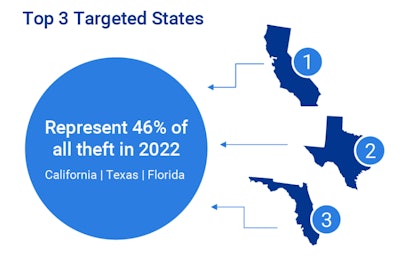Instances of cargo theft increased markedly in 2022, driven in large measure by thieves using fictitious pickups.
CargoNet recorded 1,778 supply chain risk events across the United States and Canada in 2022, an increase of 15% from 2021. They estimate $223 million in cargo was stolen across all theft events in 2022.

The company said supply chain disruptions were one of the main concerns of the year because of their effect on inflation. Scarcity and cost drove illicit market demand for goods that were most affected like computer graphics cards and raw beef, poultry, and pork. Available capacity eased in the later months of 2022, but theft remained a prominent threat.
Increases in theft activity around major intermodal hubs were significant, according to CargoNet. California remained the top state for reported events in 2022; theft in the state increased 41% year-over-year. Computer and green energy components were some of the most frequently stolen items. California is a major logistics hub for these items.
Theft in Georgia increased by 34% year-over-year, due in part to organized crime groups that took advantage of increased traffic to the Port of Savannah.
Household items were the most stolen commodity in 2022. CargoNet said this is a diverse category that includes appliances and furniture which often get targeted during long haul and final mile distribution. There was also a notable increase in the theft of shipments of tools and toys.
Household items were closely followed by electronics. Theft of computer electronics decreased by 37% from 2021. CargoNet noted theft of these products reached unprecedented highs in 2021 and theft was still elevated compared to the baseline. Additionally, theft of televisions and other displays nearly doubled from 2021.
CargoNet cautions shippers and carriers to be on the lookout for fictitious cargo pickups, a scheme the company calls “a blend of identity theft and cargo theft that can affect all parties in a supply chain.” CargoNet said it recorded 96 more fictitious pickups in 2022 compared to the year prior, a 600% increase year-over-year.
Most fictitious cargo pickups occurred in California (74% of the total), but the crime is spreading across the country and CargoNet said it has recently received reports of similar fictitious pickups in Washington, New Jersey, Pennsylvania, Illinois, Texas, and other states. Shipments of solar modules, auto parts, and vehicle maintenance products like engine oil are most at risk, but the threat extends to most categories of goods, according to CargoNet.
This style of fictitious cargo pickup relies heavily on subcontracting the shipment to a legitimate motor carrier and having the shipment misdirected to another address, CargoNet said in a statement. Logistics brokers and shippers can help prevent fictitious cargo pickups by verifying any bids on shipments with the motor carrier through their contact information on file with the Federal Motor Carrier Safety Administration and verifying the name of the motor carrier and driver matches who the shipment was tendered to.
CargoNet also said motor carriers should also be wary of new customers that offer payment through peer-to-peer money transfer apps if their business would haul a blind shipment delivering to an address different from the bill of lading, especially if the address is a public warehouse or cross-dock in California.
